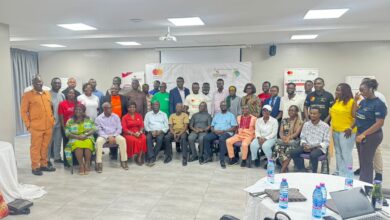Strengthening Ghana’s Tax System: Executive Director Calls for Action on Loopholes and Equity

The Executive Director with the Green Tax Youth Africa, Mr. Benaiah Nii Addo has issued a strong call to action for the Ghanaian government to close tax loopholes, strengthen tax administration and enforcement mechanisms, and prioritize equity in the national tax system.
Speaking during a two-day training workshop for journalists on Illicit Financial Flows (IFFs) and progressive taxation, Mr. Addo painted a concerning picture of the gaps in the country’s tax regime—particularly in sectors like real estate, multinational retail operations, and the informal economy.
“We are simply not enforcing the policies we already have,” he said. “Take real estate, for example—people can walk in with cash and purchase properties without any paper trail. The illicit nature of these transactions bypass the banking system entirely, creating a haven for illicit financial flows.”
Mr. Addo emphasized the need for urgent government intervention in this area, urging policymakers to take “keen interest” in regulating real estate transactions to improve transparency and accountability.
Beyond the real estate, Mr. Addo highlighted tax evasion by some multinational companies operating in Ghana. “These companies often repatriate all their profits without paying taxes, like the shell companies. Their only interest is making profts,” he noted. “The government must ensure that such businesses comply with the tax policies by contributing their fair share.”
He also raised concerns about tax avoidance, especially among companies that benefit from tax incentives under the guise of corporate social responsibility (CSR). “CSR is voluntary and largely unregulated in Ghana. While companies claim to support local communities, there is no framework to monitor or evaluate these projects,” he said. “We must ensure that these CSR projects align with the tax exemptions they enjoy.”
Mr. Addo called for a more robust paperless financial system, praising the current interoperability of the digital platforms, especially in the public sector where electronic salary payments have become the norm. However, he warned that more needs to be done to enforce digital transactions across the board, particularly in the private sector, especially now that the digital economy is booming.
“Multinational supermarkets and retail chains also need better monitoring systems,” he stressed. “While some measures are in place, we need to go deeper. The government should standardize digital receipts and require detailed reporting so we can track sales with taxes accurately.”
A significant portion of his remarks focused on the informal sector, where tax collection remains a major challenge due to a lack of digital literacy and user-friendly platforms. “The online tax filing systems must be simplified,” he said. “People have smartphones but don’t know how to use them to file taxes. That’s a problem.”
He added that, tax education and capacity-building programs by GRA should not be limited to the public sector. “We must bring tax knowledge to the markets, to the traders, to those who operate informally. Capacitating them will address compliance challenges.”
In his appeal for public accountability, Mr. Addo stressed the importance of tax administration, public financial management, and transparency in the use of tax revenues. “People want to see their taxes at work—building roads, markets, schools, and hospitals,” he said. “When citizens see the results, they are more willing to pay.”
Mr. Addo concluded with a strong endorsement of a progressive tax system, where individuals are taxed based on their income levels. “The rich should pay more, and the poor should pay less. That’s how we ensure fairness and sustainability,” he stated. “Many people want to comply, but when the system appears skewed in favor of the rich, it becomes a disincentive.”
He also called for better use of the Communication Service Tax (CST) to tackle unemployment. “This tax was supposed to create jobs. The government must explore how these funds can actually be used to create jobs so people who are employed will then join the tax base and contribute towards development.”
The two-day training was part of broader efforts to build media capacity on issues related to taxation and illicit financial flows. It brought together journalists from across Ghana.
The training workshop forms part of interventions by the MFWA to enhance knowledge, raise awareness and equip journalists with the relevant knowledge and skills needed to effectively report on the impact of Illicit Financial Flows (IFFs) and Taxation to address the development deficit in Ghana.
This training is also part of the MFWA’s project titled: “Strategic Partnership Initiative for Ghana and West Africa” funded by the Danish International Development Agency (DANIDA)/Ministry of Foreign Affairs of Denmark through OXFAM in Ghana.






